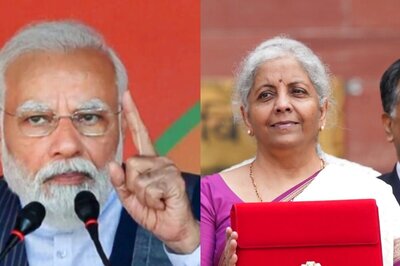
views
Data of Indians belongs to the community and the country and the government will never compromise on its sovereignty, Law and IT minister Ravi Shankar Prasad said on Saturday.
The minister said that the government is bringing a data protection law which is being examined by a select committee of Parliament.
"I have been advocating that data of Indians belongs to Indians. Data of Indians belong to the community and data of Indians belong to the sovereign of India. This articulation that India has formulated is now finding global results. Under no circumstances we shall tolerate data imperialism," Prasad said.
"Data is a nation's asset. This great asset of data has to be properly used, processed and value added for healthcare, agriculture and education. Therefore, not only data ownership but also data sovereignty becomes important," the Union minister said.
"If data is a good asset it must be secured and vested into the sovereign power of a country. Therefore, we have brought data protection law which is being examined by the select committee of the Parliament," Prasad said.
Observing that data must be secured, Prasad said the government had in the first week of December last year approved the Personal Data Protection Bill that will spell out a framework for handling of personal data, including its processing by public and private entities.
Prasad, who holds the Law and Justice, Electronics and Information Technology and Communications portfolios, was delivering the Late Thakur Prasad Centenary Memorial Lecture on "Data Privacy, Data Security and Data Sovereignty".
The programme was organised by an organisation called Aatma Bodh. Late Thakur Prasad, a veteran Jan Sangh leader who served as a minister in Bihar in 1977, is the father of the minister.
He said that Digital India today has become a transformative programme whereby common Indians are getting empowered through technology.
The "great JAM trinity- Jan Dhan, Aadhaar and Mobile - has led to transformation in governance," he said.
The central government has transferred close to Rs 11 lakh crore directly into the bank accounts of the poor under direct benefit transfer (DBT) scheme and saved Rs 1.70 lakh crore which used to be pocketed by fake beneficiaries and middle men, Prasad said.
A digital ecosystem generates a lot of data and the vast size and population of India with 120 crore plus mobile phones and nearly 70 crore plus internet users have become a new tool in the hands of the common man, he said.
The Union minister said that Aadhaar itself undertakes three crore authentications every day.
Platforms like e-scholarship, e-hospitals, soil health card, GSTN, UPI, Ayushman Bharat are all game changing programmes which have improved governance and delivery, Prasad added.
Prominent among those who spoke on the occasion included Patna High Court Chief Justice Sanjay Karol, former Supreme Court Judge and Chairman of Press Council of India Justice C K Prasad, retired Chief Justice of J&K and Rajasthan High Court Justice S N Jha, former Jharkhand HC judge and judicial member of National Company Law Tribunal Ananth Vijay Singh.
Prasad said that coronavirus pandemic has changed times and people have started working online including courts.
"High courts have handled 1,75,000 cases virtually, subordinate courts have conducted 7,34,600 cases and Supreme Court has 7,800 cases. It's a big thing that districts have courts that have conducted over 7 lakh cases," Prasad said.
The minister said that from electronic manufacturing to digital ecosystem digital delivery of services, e-courts, e-kisan, e-health etc all are working together to empower India but at the same time there is a need for precaution as well.


















Comments
0 comment